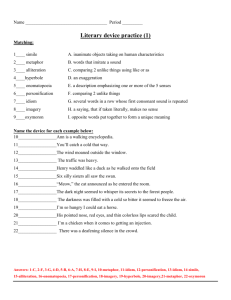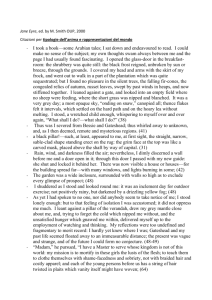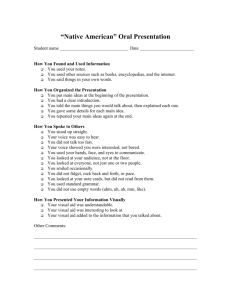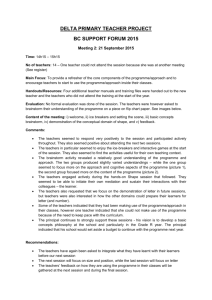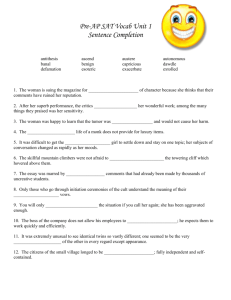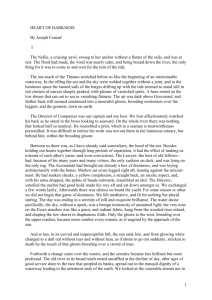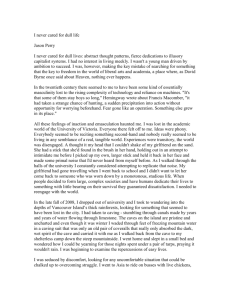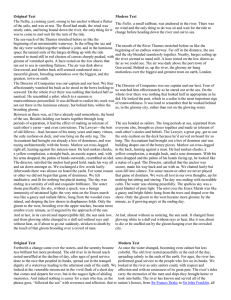Excerpts
advertisement
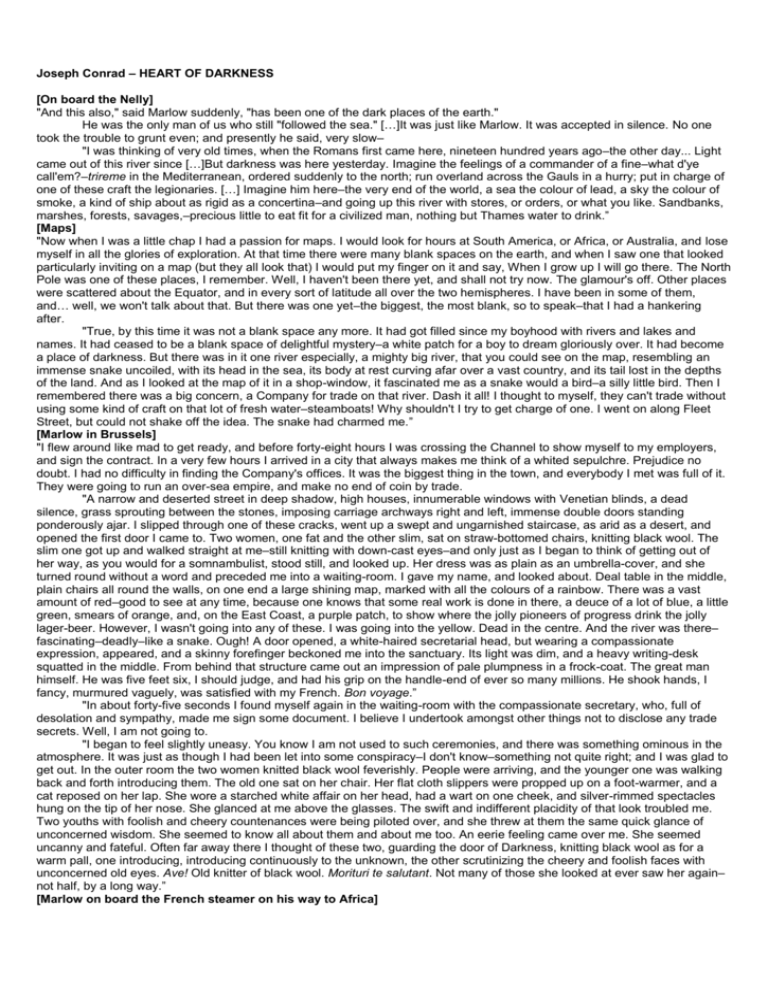
Joseph Conrad – HEART OF DARKNESS [On board the Nelly] "And this also," said Marlow suddenly, "has been one of the dark places of the earth." He was the only man of us who still "followed the sea." […]It was just like Marlow. It was accepted in silence. No one took the trouble to grunt even; and presently he said, very slow– "I was thinking of very old times, when the Romans first came here, nineteen hundred years ago–the other day... Light came out of this river since […]But darkness was here yesterday. Imagine the feelings of a commander of a fine–what d'ye call'em?–trireme in the Mediterranean, ordered suddenly to the north; run overland across the Gauls in a hurry; put in charge of one of these craft the legionaries. […] Imagine him here–the very end of the world, a sea the colour of lead, a sky the colour of smoke, a kind of ship about as rigid as a concertina–and going up this river with stores, or orders, or what you like. Sandbanks, marshes, forests, savages,–precious little to eat fit for a civilized man, nothing but Thames water to drink.” [Maps] "Now when I was a little chap I had a passion for maps. I would look for hours at South America, or Africa, or Australia, and lose myself in all the glories of exploration. At that time there were many blank spaces on the earth, and when I saw one that looked particularly inviting on a map (but they all look that) I would put my finger on it and say, When I grow up I will go there. The North Pole was one of these places, I remember. Well, I haven't been there yet, and shall not try now. The glamour's off. Other places were scattered about the Equator, and in every sort of latitude all over the two hemispheres. I have been in some of them, and… well, we won't talk about that. But there was one yet–the biggest, the most blank, so to speak–that I had a hankering after. "True, by this time it was not a blank space any more. It had got filled since my boyhood with rivers and lakes and names. It had ceased to be a blank space of delightful mystery–a white patch for a boy to dream gloriously over. It had become a place of darkness. But there was in it one river especially, a mighty big river, that you could see on the map, resembling an immense snake uncoiled, with its head in the sea, its body at rest curving afar over a vast country, and its tail lost in the depths of the land. And as I looked at the map of it in a shop-window, it fascinated me as a snake would a bird–a silly little bird. Then I remembered there was a big concern, a Company for trade on that river. Dash it all! I thought to myself, they can't trade without using some kind of craft on that lot of fresh water–steamboats! Why shouldn't I try to get charge of one. I went on along Fleet Street, but could not shake off the idea. The snake had charmed me.” [Marlow in Brussels] "I flew around like mad to get ready, and before forty-eight hours I was crossing the Channel to show myself to my employers, and sign the contract. In a very few hours I arrived in a city that always makes me think of a whited sepulchre. Prejudice no doubt. I had no difficulty in finding the Company's offices. It was the biggest thing in the town, and everybody I met was full of it. They were going to run an over-sea empire, and make no end of coin by trade. "A narrow and deserted street in deep shadow, high houses, innumerable windows with Venetian blinds, a dead silence, grass sprouting between the stones, imposing carriage archways right and left, immense double doors standing ponderously ajar. I slipped through one of these cracks, went up a swept and ungarnished staircase, as arid as a desert, and opened the first door I came to. Two women, one fat and the other slim, sat on straw-bottomed chairs, knitting black wool. The slim one got up and walked straight at me–still knitting with down-cast eyes–and only just as I began to think of getting out of her way, as you would for a somnambulist, stood still, and looked up. Her dress was as plain as an umbrella-cover, and she turned round without a word and preceded me into a waiting-room. I gave my name, and looked about. Deal table in the middle, plain chairs all round the walls, on one end a large shining map, marked with all the colours of a rainbow. There was a vast amount of red–good to see at any time, because one knows that some real work is done in there, a deuce of a lot of blue, a little green, smears of orange, and, on the East Coast, a purple patch, to show where the jolly pioneers of progress drink the jolly lager-beer. However, I wasn't going into any of these. I was going into the yellow. Dead in the centre. And the river was there– fascinating–deadly–like a snake. Ough! A door opened, a white-haired secretarial head, but wearing a compassionate expression, appeared, and a skinny forefinger beckoned me into the sanctuary. Its light was dim, and a heavy writing-desk squatted in the middle. From behind that structure came out an impression of pale plumpness in a frock-coat. The great man himself. He was five feet six, I should judge, and had his grip on the handle-end of ever so many millions. He shook hands, I fancy, murmured vaguely, was satisfied with my French. Bon voyage.” "In about forty-five seconds I found myself again in the waiting-room with the compassionate secretary, who, full of desolation and sympathy, made me sign some document. I believe I undertook amongst other things not to disclose any trade secrets. Well, I am not going to. "I began to feel slightly uneasy. You know I am not used to such ceremonies, and there was something ominous in the atmosphere. It was just as though I had been let into some conspiracy–I don't know–something not quite right; and I was glad to get out. In the outer room the two women knitted black wool feverishly. People were arriving, and the younger one was walking back and forth introducing them. The old one sat on her chair. Her flat cloth slippers were propped up on a foot-warmer, and a cat reposed on her lap. She wore a starched white affair on her head, had a wart on one cheek, and silver-rimmed spectacles hung on the tip of her nose. She glanced at me above the glasses. The swift and indifferent placidity of that look troubled me. Two youths with foolish and cheery countenances were being piloted over, and she threw at them the same quick glance of unconcerned wisdom. She seemed to know all about them and about me too. An eerie feeling came over me. She seemed uncanny and fateful. Often far away there I thought of these two, guarding the door of Darkness, knitting black wool as for a warm pall, one introducing, introducing continuously to the unknown, the other scrutinizing the cheery and foolish faces with unconcerned old eyes. Ave! Old knitter of black wool. Morituri te salutant. Not many of those she looked at ever saw her again– not half, by a long way.” [Marlow on board the French steamer on his way to Africa] "I left in a French steamer, and she called in every blamed port they have out there, for, as far as I could see, the sole purpose of landing soldiers and custom-house officers. I watched the coast. Watching a coast as it slips by the ship is like thinking about an enigma. There it is before you–smiling, frowning, inviting, grand, mean, insipid, or savage, and always mute with an air of whispering, Come and find out. This one was almost featureless, as if still in the making, with an aspect of monotonous grimness. The edge of a colossal jungle, so dark-green as to be almost black, fringed with white surf, ran straight, like a ruled line, far, far away along a blue sea whose glitter was blurred by a creeping mist. The sun was fierce, the land seemed to glisten and drip with steam. Here and there greyish-whitish specks showed up, clustered inside the white surf, with a flag flying above them perhaps. Settlements some centuries old, and still no bigger than pin-heads on the untouched expanse of their background. We pounded along, stopped, landed soldiers; went on, landed custom-house clerks to levy toll in what looked like a God-forsaken wilderness, with a tin shed and a flag-pole lost in it; landed more soldiers–to take care of the custom-house clerks, presumably. Some, I heard, got drowned in the surf; but whether they did or not, nobody seemed particularly to care. They were just flung out there, and on we went. Every day the coast looked the same, as though we had not moved; but we passed various places–trading places–with names like Gran' Bassam Little Popo, names that seemed to belong to some sordid farce acted in front of a sinister backcloth. The idleness of a passenger, my isolation amongst all these men with whom I had no point of contact, the oily and languid sea, the uniform sombreness of the coast, seemed to keep me away from the truth of things, within the toil of a mournful and senseless delusion. The voice of the surf heard now and then was a positive pleasure, like the speech of a brother. It was something natural, that had its reason, that had a meaning. Now and then a boat from the shore gave one a momentary contact with reality. It was paddled by black fellows. You could see from afar the white of their eyeballs glisten- ing. They shouted, sang; their bodies streamed with perspiration; they had faces like grotesque masks–these chaps; but they had bone, muscle, a wild vitality, an intense energy of movement, that was as natural and true as the surf along their coast. They wanted no excuse for being there. They were a great comfort to look at. For a time I would feel I belonged still to a world of straightforward facts; but the feeling would not last long. Something would turn up to scare it away. Once, I remember, we came upon a man-of-war anchored off the coast. There wasn't even a shed there, and she was shelling the bush. It appears the French had one of their wars going on thereabouts. Her ensign dropped limp like a rag; the muzzles of the long eight-inch guns stuck out all over the low hull; the greasy, slimy swell swung her up lazily and let her down, swaying her thin masts. In the empty immensity of earth, sky, and water, there she was, incomprehensible, firing into a continent. Pop, would go one of the eight-inch guns; a small flame would dart and vanish, a little white smoke would disappear, a tiny projectile would give a feeble screech–and nothing happened. Nothing could happen. There was a touch of insanity in the proceeding, a sense of lugubrious drollery in the sight; and it was not dissipated by somebody on board assuring me earnestly there was a camp of natives–he called them enemies!–hidden out of sight somewhere.” [The Outer Station] "I avoided a vast artificial hole somebody had been digging on the slope, the purpose of which I found it impossible to divine. It wasn't a quarry or a sandpit, anyhow. It was just a hole. It might have been connected with the philanthropic desire of giving the criminals something to do. I don't know. Then I nearly fell into a very narrow ravine, almost no more than a scar in the hillside. I discovered that a lot of imported drainage-pipes for the settlement had been tumbled in there. There wasn't one that was not broken. It was a wanton smash-up. At last I got under the trees. My purpose was to stroll into the shade for a moment; but no sooner within than it seemed to me I had stepped into a gloomy circle of some Inferno. The rapids were near, and an uninterrupted, uniform, headlong, rushing noise filled the mournful stillness of the grove, where not a breath stirred, not a leaf moved, with a mysterious sound--as though the tearing pace of the launched earth had suddenly become audible. "Black shapes crouched, lay, sat between the trees, leaning against the trunks, clinging to the earth, half coming out, half effaced within the dim light, in all the attitudes of pain, abandonment, and despair. Another mine on the cliff went off, followed by a slight shudder of the soil under my feet. The work was going on. The work! And this was the place where some of the helpers had withdrawn to die. "They were dying slowly–it was very clear. They were not enemies, they were not criminals, they were nothing earthly now,–nothing but black shadows of disease and starvation, lying confusedly in the greenish gloom. Brought from all the recesses of the coast in all the legality of time contracts, lost in uncongenial surroundings, fed on unfamiliar food, they sickened, became inefficient, and were then allowed to crawl away and rest. These moribund shapes were free as air–and nearly as thin. I began to distinguish the gleam of eyes under the trees. Then, glancing down, I saw a face near my hand. The black bones reclined at full length with one shoulder against the tree, and slowly the eye-lids rose and the sunken eyes looked up at me, enormous and vacant, a kind of blind, white flicker in the depths of the orbs, which died out slowly. The man seemed young– almost a boy–but you know with them it's hard to tell. I found nothing else to do but to offer him one of my good Swede's ship's biscuits I had in my pocket. The fingers closed slowly on it and held–there was no other movement and no other glance. He had tied a bit of white worsted round his neck–Why? Where did he get it? Was it a badge–an ornament–a charm–a propitiatory act? Was there any idea at all connected with it? It looked startling round his black neck, this bit of white thread from beyond the seas.” [The Central Sation] “Then I noticed a small sketch in oils, on a panel, representing a woman, draped and blindfolded, carrying a lighted torch. The background was sombre–almost black. The movement of the woman was stately, and the effect of the torchlight on the face was sinister. "It arrested me, and he stood by civilly, holding a half-pint champagne bottle (medical comforts) with the candle stuck in it. To my question he said Mr. Kurtz had painted this–in this very station more than a year ago–while waiting for means to go to his trading-post.” [Marlow travelling up the River Congo] "The earth seemed unearthly. We are accustomed to look upon the shackled form of a conquered monster, but there–there you could look at a thing monstrous and free. It was unearthly, and the men were– No, they were not inhuman. Well, you know, that was the worst of it–this suspicion of their not being inhuman. It would come slowly to one. They howled, and leaped, and spun, and made horrid faces; but what thrilled you was just the thought of their humanity–like yours–the thought of your remote kinship with this wild and passionate uproar. Ugly. Yes, it was ugly enough; but if you were man enough you would admit to yourself that there was in you just the faintest trace of a response to the terrible frankness of that noise, a dim suspicion of there being a meaning in it which you–you so remote from the night of first ages–could comprehend. And why not? The mind of man is capable of anything–because everything is in it, all the past as well as all the future. What was there after all? Joy, fear, sorrow, devotion, valour, rage–who can tell? – but truth–truth stripped of its cloak of time. Let the fool gape and shudder–the man knows, and can look on without a wink. But he must at least be as much of a man as these on the shore. He must meet that truth with his own true stuff–with his own inborn strength. Principles? Principles won't do. Acquisitions, clothes, pretty rags– rags that would fly off at the first good shake. No; you want a deliberate belief. An appeal to me in this fiendish row–is there? Very well; I hear; I admit, but I have a voice too, and for good or evil mine is the speech that cannot be silenced. Of course, a fool, what with sheer fright and fine sentiments, is always safe. Who's that grunting? You wonder I didn't go ashore for a howl and a dance? Well, no–I didn't. Fine sentiments, you say? Fine sentiments, be hanged! I had no time. I had to mess about with white-lead and strips of woollen blanket helping to put bandages on those leaky steam-pipes–I tell you. I had to watch the steering, and circumvent those snags, and get the tin-pot along by hook or by crook. There was surface-truth enough in these things to save a wiser man. And between whiles I had to look after the savage who was fireman. He was an improved specimen; he could fire up a vertical boiler. He was there below me, and, upon my word, to look at him was as edifying as seeing a dog in a parody of breeches and a feather hat, walking on his hind-legs. A few months of training had done for that really fine chap. He squinted at the steam-gauge and at the water-gauge with an evident effort of intrepidity–and he had filed teeth too, the poor devil, and the wool of his pate shaved into queer patterns, and three ornamental scars on each of his cheeks. He ought to have been clapping his hands and stamping his feet on the bank, instead of which he was hard at work, a thrall to strange witchcraft, full of improving knowledge. He was useful because he had been instructed; and what he knew was this–that should the water in that transparent thing disappear, the evil spirit inside the boiler would get angry through the greatness of his thirst, and take a terrible vengeance. So he sweated and fired up and watched the glass fearfully (with an impromptu charm, made of rags, tied to his arm, and a piece of polished bone, as big as a watch, stuck flatways through his lower lip), while the wooded banks slipped past us slowly, the short noise was left behind, the interminable miles of silence–and we crept on, towards Kurtz. But the snags were thick, the water was treacherous and shallow, the boiler seemed indeed to have a sulky devil in it, and thus neither that fireman nor I had any time to peer into our creepy thoughts.” [Cannibals on board] "I went forward, and ordered the chain to be hauled in short, so as to be ready to trip the anchor and move the steamboat at once if necessary. 'Will they attack?' whispered an awed voice. 'We will all be butchered in this fog,' murmured another. The faces twitched with the strain, the hands trembled slightly, the eyes forgot to wink. It was very curious to see the contrast of expressions of the white men and of the black fellows of our crew, who were as much strangers to that part of the river as we, though their homes were only eight hundred miles away. The whites, of course greatly discomposed, had besides a curious look of being painfully shocked by such an outrageous row. The others had an alert, naturally interested expression; but their faces were essentially quiet, even those of the one or two who grinned as they hauled at the chain. Several exchanged short, grunting phrases, which seemed to settle the matter to their satisfaction. Their headman, a young, broad-chested black, severely draped in dark-blue fringed cloths, with fierce nostrils and his hair all done up artfully in oily ringlets, stood near me. 'Aha!' I said, just for good fellowship's sake. 'Catch 'im,' he snapped, with a bloodshot widening of his eyes and a flash of sharp teeth–'catch 'im. Give 'im to us.' 'To you, eh?' I asked; 'what would you do with them?' 'Eat 'im!' he said curtly, and, leaning his elbow on the rail, looked out into the fog in a dignified and profoundly pensive attitude. I would no doubt have been properly horrified, had it not occurred to me that he and his chaps must be very hungry: that they must have been growing increasingly hungry for at least this month past. They had been engaged for six months (I don't think a single one of them had any clear idea of time, as we at the end of countless ages have. They still belonged to the beginnings of time–had no inherited experience to teach them as it were), and of course, as long as there was a piece of paper written over in accordance with some farcical law or other made down the river, it didn't enter anybody's head to trouble how they would live. Certainly they had brought with them some rotten hippo-meat, which couldn't have lasted very long, anyway, even if the pilgrims hadn't, in the midst of a shocking hullabaloo, thrown a considerable quantity of it overboard. It looked like a high-handed proceeding; but it was really a case of legitimate self-defence. You can't breathe dead hippo waking, sleeping, and eating, and at the same time keep your precarious grip on existence. Besides that, they had given them every week three pieces of brass wire, each about nine inches long; and the theory was they were to buy their provisions with that currency in river-side villages. You can see how THAT worked. There were either no villages, or the people were hostile, or the director, who like the rest of us fed out of tins, with an occasional old he-goat thrown in, didn't want to stop the steamer for some more or less recondite reason. So, unless they swallowed the wire itself, or made loops of it to snare the fishes with, I don't see what good their extravagant salary could be to them. I must say it was paid with a regularity worthy of a large and honourable trading company. For the rest, the only thing to eat–though it didn't look eatable in the least–I saw in their possession was a few lumps of some stuff like half-cooked dough, of a dirty lavender colour, they kept wrapped in leaves, and now and then swallowed a piece of, but so small that it seemed done more for the looks of the thing than for any serious purpose of sustenance. Why in the name of all the gnawing devils of hunger they didn't go for us–they were thirty to five–and have a good tuck in for once, amazes me now when I think of it. They were big powerful men, with not much capacity to weigh the consequences, with courage, with strength, even yet, though their skins were no longer glossy and their muscles no longer hard. And I saw that something restraining, one of those human secrets that baffle probability, had come into play there. I looked at them with a swift quickening of interest–not because it occurred to me I might be eaten by them before very long, though I own to you that just then I perceived–in a new light, as it were–how unwholesome the pilgrims looked, and I hoped, yes, I positively hoped, that my aspect was not so–what shall I say?–so–unappetizing: a touch of fantastic vanity which fitted well with the dream-sensation that pervaded all my days at that time. Perhaps I had a little fever too. One can't live with one's finger everlastingly on one's pulse. I had often 'a little fever,' or a little touch of other things–the playful paw-strokes of the wilderness, the preliminary trifling before the more serious onslaught which came in due course. Yes; I looked at them as you would on any human being, with a curiosity of their impulses, motives, capacities, weaknesses, when brought to the test of an inexorable physical necessity. Restraint! What possible restraint? Was it superstition, disgust, patience, fear–or some kind of primitive honour? No fear can stand up to hunger, no patience can wear it out, disgust simply does not exist where hunger is; and as to superstition, beliefs, and what you may call principles, they are less than chaff in a breeze. Don't you know the devilry of lingering starvation, its exasperating torment, its black thoughts, its sombre and brooding ferocity? Well, I do. It takes a man all his inborn strength to fight hunger properly. It's really easier to face bereavement, dishonour, and the perdition of one's soul--than this kind of prolonged hunger. Sad, but true. And these chaps too had no earthly reason for any kind of scruple. Restraint! I would just as soon have expected restraint from a hyena prowling amongst the corpses of a battlefield. But there was the fact facing me–the fact dazzling, to be seen, like the foam on the depths of the sea, like a ripple on an unfathomable enigma, a mystery greater–when I thought of it–than the curious, inexplicable note of desperate grief in this savage clamour that had swept by us on the river-bank, behind the blind whiteness of the fog.” [Marlow at Kurtz’s hut] „And then I made a brusque movement, and one of the remaining posts of that vanished fence leaped up in the field of my glass. You remember I told you I had been struck at the distance by certain attempts at ornamentation, rather remarkable in the ruinous aspect of the place. Now I had suddenly a nearer view, and its first result was to make me throw my head back as if before a blow. Then I went carefully from post to post with my glass, and I saw my mistake. These round knobs were not ornamental but symbolic; they were expressive and puzzling, striking and disturbing–food for thought and also for the vultures if there had been any looking down from the sky; but at all events for such ants as were industrious enough to ascend the pole. They would have been even more impressive, those heads on the stakes, if their faces had not been turned to the house. Only one, the first I had made out, was facing my way. I was not so shocked as you may think. The start back I had given was really nothing but a movement of surprise. I had expected to see a knob of wood there, you know. I returned deliberately to the first I had seen–and there it was, black, dried, sunken, with closed eye-lids–a head that seemed to sleep at the top of that pole, and, with the shrunken dry lips showing a narrow white line of the teeth, was smiling too, smiling continuously at some endless and jocose dream of that eternal slumber.” [Kurtz’s African mistress] "Dark human shapes could be made out in the distance. […] And from right to left along the lighted shore moved a wild and gorgeous apparition of a woman. She walked with measured steps, draped in striped and fringed cloths, treading the earth proudly, with a slight jingle and flash of barbarous ornaments. She carried her head high; her hair was done in the shape of a helmet; she had brass leggings to the knee, brass wire gauntlets to the elbow, a crimson spot on her tawny cheek, innumerable necklaces of glass beads on her neck; bizarre things, charms, gifts of witch-men, that hung about her, glittered and trembled at every step. She must have had the value of several elephant tusks upon her. She was savage and superb, wild-eyed and magnificent; there was something ominous and stately in her deliberate progress. […] She stood looking at us without a stir and like the wilderness itself, with an air of brooding over an inscrutable purpose. A whole minute passed, and then she made a step forward. […] Suddenly she opened her bared arms and threw them up rigid above her head, as though in an uncontrollable desire to touch the sky, and at the same time the swift shadows darted out on the earth, swept around on the river, gathering the steamer into a shadowy embrace. A formidable silence hung over the scene. She turned away slowly, walked on, following the bank, and passed into the bushes to the left.” [Kurtz dies] He cried in a whisper at some image, at some vision,–he cried out twice, a cry that was no more than a breath– "'The horror! The horror!' "I blew the candle out and left the cabin. The pilgrims were dining in the mess-room, and I took my place opposite the manager, who lifted his eyes to give me a questioning glance, which I successfully ignored. He leaned back, serene, with that peculiar smile of his sealing the unexpressed depths of his meanness. A continuous shower of small flies streamed upon the lamp, upon the cloth, upon our hands and faces. Suddenly the manager's boy put his insolent black head in the doorway, and said in a tone of scathing contempt–"'Mistah Kurtz–he dead.' [The Intended] "She came forward, all in black, with a pale head, floating towards me in the dusk. She was in mourning. It was more than a year since his death, more than a year since the news came; she seemed as though she would remember and mourn for ever. She took both my hands in hers and murmured, 'I had heard you were coming.' I noticed she was not very young–I mean not girlish. She had a mature capacity for fidelity, for belief, for suffering. The room seemed to have grown darker, as if all the sad light of the cloudy evening had taken refuge on her forehead. This fair hair, this pale visage, this pure brow, seemed surrounded by an ashy halo from which the dark eyes looked out at me. Their glance was guileless, profound, confident, and trustful. She carried her sorrowful head as though she were proud of that sorrow, as though she would say, I –I alone know how to mourn for him as he deserves. […] She had said, with a deep catch of the breath, 'I have survived;' while my strained ears seemed to hear distinctly, mingled with her tone of despairing regret, the summing-up whisper of his eternal condemnation. I asked myself what I was doing there, with a sensation of panic in my heart as though I had blundered into a place of cruel and absurd mysteries not fit for a human being to behold. She motioned me to a chair. We sat down. I laid the packet gently on the little table, and she put her hand over it… 'You knew him well,' she murmured, after a moment of mourning silence.” [The end] Marlow ceased, and sat apart, indistinct and silent, in the pose of a meditating Buddha. Nobody moved for a time. "We have lost the first of the ebb," said the Director, suddenly. I raised my head. The offing was barred by a black bank of clouds, and the tranquil water-way leading to the uttermost ends of the earth flowed sombre under an overcast sky–seemed to lead into the heart of an immense darkness.

